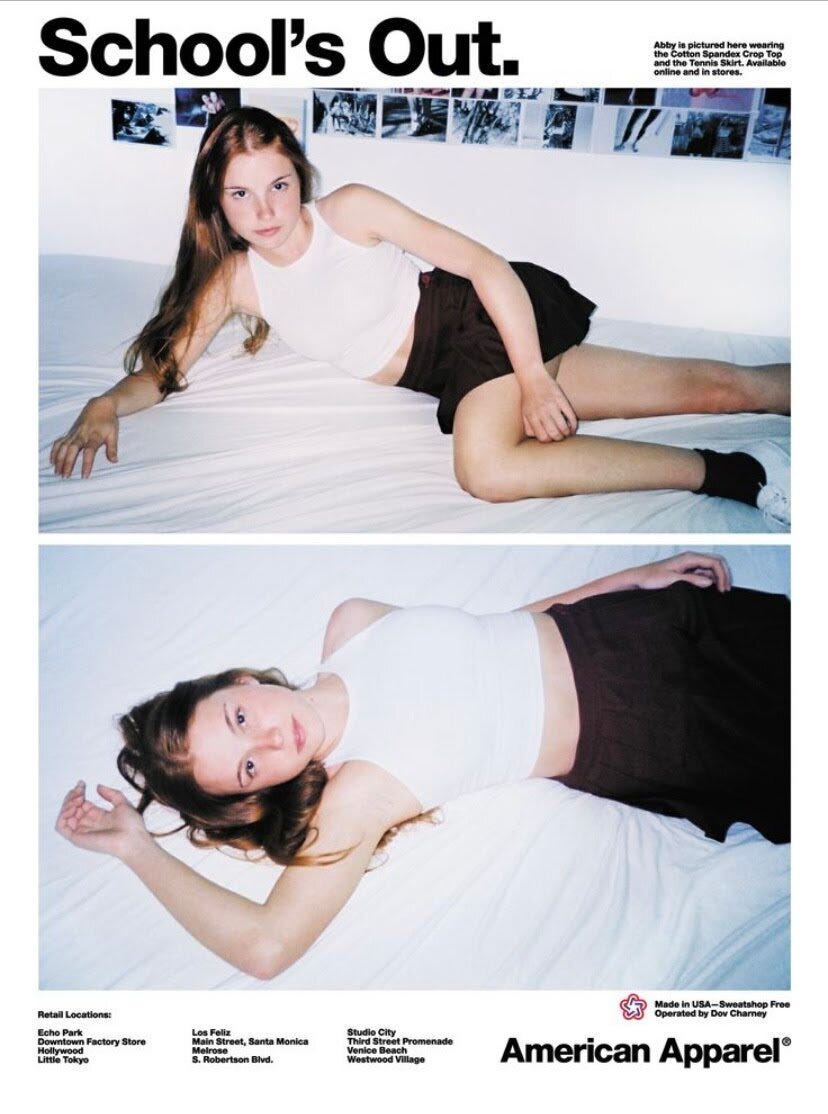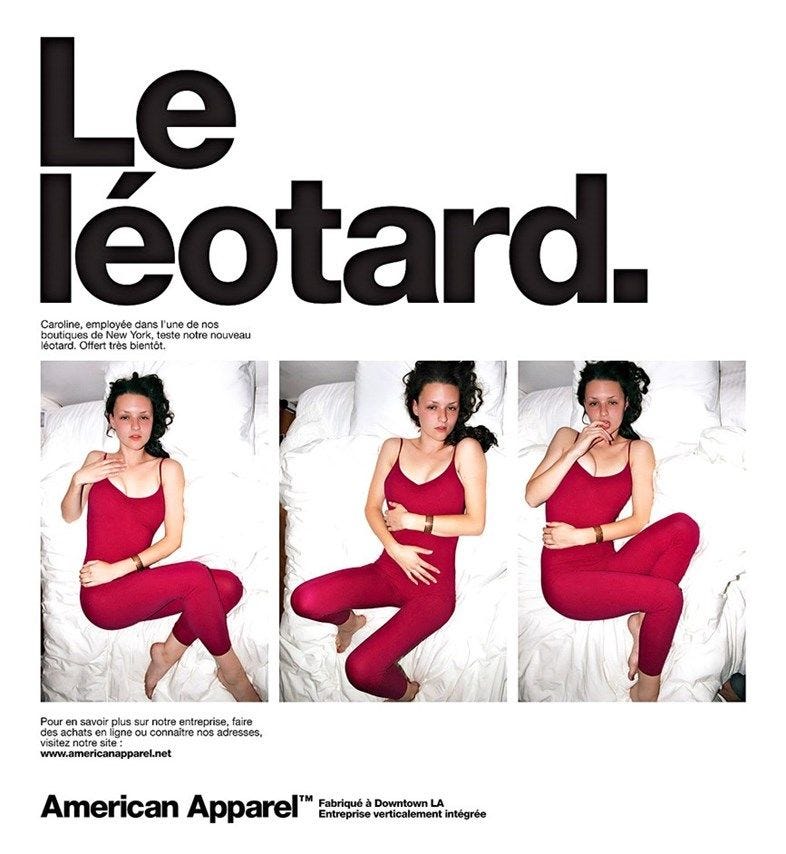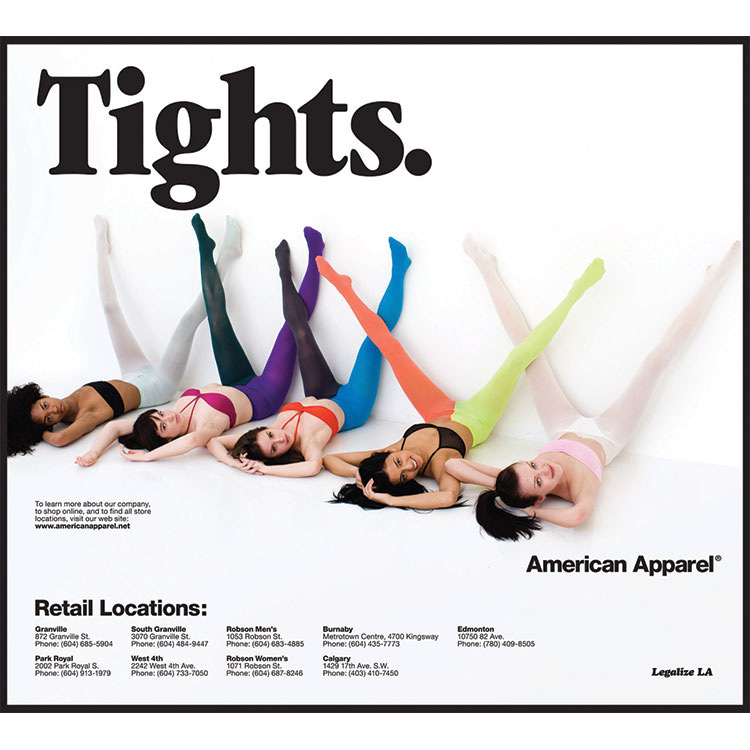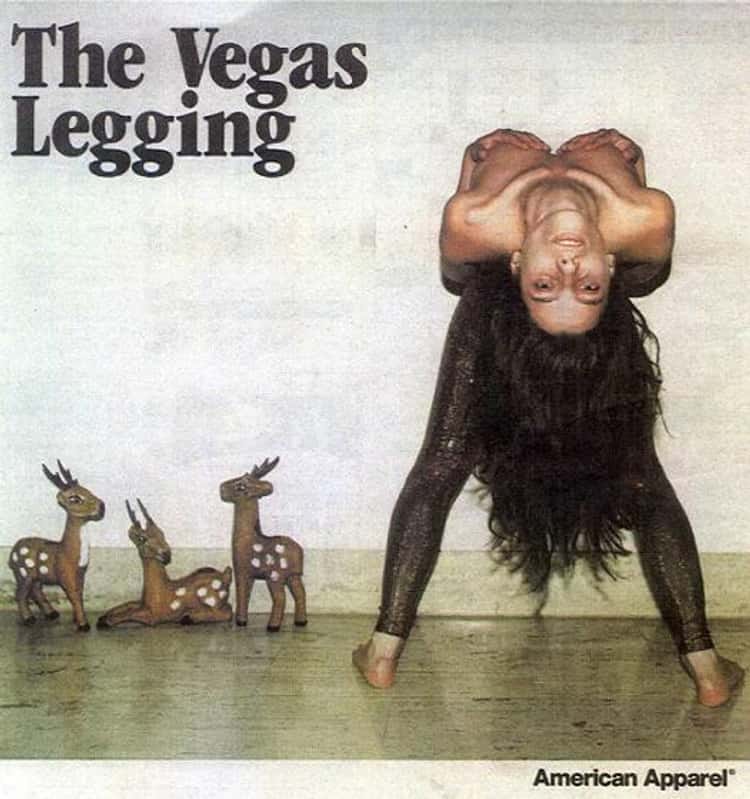Issue 11 – How the Hell did Dov Charney Get Away With This?!
The American Apparel founder was just straight-up committing sex crimes in front of a journalist for the sake of it.
White Hot: The Rise & Fall of Abercrombie & Fitch is a 2022 documentary from Netflix, one of a big 2020s pop culture trend focused on “scams.” While the film itself isn’t as juicy as many were hoping it would be, it was another nail in the coffin for a previously ubiquitous brand that had long been mired in sleaze. For a certain generation of my American friends, Abercrombie & Fitch were inescapable, the pinnacle of the late '90s zeitgeist and a defining part of that era's image. Abercrombie stores anchored many a local mall and its employees -- all mega-hot and built and dressed in the brand -- were positioned as a kind of aspirational force. In a now-infamous interview from 2006, the company's former CEO Mike Jeffries proudly bragged that the A&F brand was "exclusionary [...] We go after the cool kids. We go after the attractive all-American kid with a great attitude and a lot of friends. A lot of people don’t belong [in our clothes], and they can’t belong." Of course, building your foundations on the notion of "cool" means you're doomed to fail, and Abercrombie & Fitch did in a major way. I recommend you watch White Hot for the full story. It got me thinking about that hyper-specific trend and the sleaze it embodied: the vile misogyny, the proud racism, the fetishizing of wealth, and, of course, the creeps who made their name from selling the lie, with their faces front and centre as part of the marketing pull. And when I think of those kinds of men, I think of Dov Charney.
Jane Magazine. "Meet Your New Boss." June/July 2004. Claudine Ko.
CONTENT WARNING: This issue includes details of sexual harassment and assault.
Born in Quebec, Dov Charney went on to establish the clothing brand American Apparel in the early '90s. Initially a wholesale business, by the early 2000s, American Apparel had become a major name with stores across the country. Publications like Inc. and Forbes talked up their hipster capitalist credentials, from the Made in the USA promise to their "cool" but accessible style. The company was ranked 308th in Inc.'s 2005 list of the 500 fastest growing companies in the United States, with a 440% three-year growth and revenues in 2005 of over $211 million. They famously ran their own marketing campaigns too, many of which were sexually focused in uncomfortable ways. Adult Video News once claimed that the American Apparel website was "one of the finer softcore websites going." Expect a lot of nudity, spread legs, porn actresses, and crotch shots. Charney bragged that he shot many of the ads himself. He even features in a few of them. The aesthetic is one of softcore porn of the digital age. It's as much about the American dream and aspiring towards it as anything Abercrombie & Fitch sold. Charney often tried to claim that much of this was satire. That line never really worked, especially after the allegations came out. Well, I say “allegations”, as if Charney’s reputation wasn’t something he shouted from the rooftops.
Dov Charney being a total creep was as big an open secret in the fashion industry as Terry Richardson being a sh*tbird harasser. Even people who weren’t familiar with that world knew the rumours. There was even a Funny or Die parody called America's Next Sick F*ck parodying both men (Charney is played by Rich Fulcher from The Mighty Boosh!) They each seemed to revel in the image of sleaze they created for both themselves and their brands. Richardson’s photography is defined by the homemade porno bright lighting, the fratty objectification of women, and his constant insertion of himself into images with his subjects. With Charney, American Apparel was positioned as his baby, the reflection of both his own ideals and that of his version of the American dream: "Liberty, property, pursuit of happiness for every man worldwide. That's my America." Note the use of “man” there. Whether that was deliberate or not on his part, it feels like an apt description of his intent. The company may have marketed heavily towards college-age young women but its prize was the adoration of men.
When journalist Claudine Ko profiled Charney in 2004, his reputation was already infamous, but her piece for the now-defunct Jane Magazine exposed new lows in his proud misogyny and abuses. The article opens with "He says I seduced him when I told him I liked dirty stories." It's a warning sign of things to come and it doesn't get any easier from there. Charney seems giddy about the prospect of not only harassing his interviewer but using her discomfort and platform to mythologize himself as the pervert CEO. And boy, the depths he sinks to…
He talks constantly about sex: how much he loves it, how good he is at it, how it sells merch, and so on. No matter where he is or who he's with, Charney is bragging about sex. "I think sex motivates everything," he says, which is a trite adage whose core point may have some merit but is widely overused by creeps with no imagination. Charney certainly likes to claim that sex is about more than his own personal gratification. He talks up how his workers "have a good time. They drink beer, they have relationships", because "You don't want something that's sexually driven, like panties, but then have them made in a horrible sweatshop." The real problem with exploitative labour is the lack of sensual appeal, apparently. He later declares that the phrase "sweatshop-free" is "crybaby", even though he seems to agree that improved wages and workplace safety are good for business and employees. Some of the factory employees and seamstresses interviewed express happiness with their good salaries and benefits such as free English language classes. But you can't just say that when you're a proud capitalist showboating creep. When everything is sex, it quickly becomes parody. You'd laugh if the truth of his past actions weren't so well documented.
The Charney self-worship wasn't just rhetoric. As Ko notes, Charney's face is everywhere in the office, on ads, and in American Apparel stores. This is a beloved tactic of many a tech bro CEO who wishes to be more beloved than your average evil rich a-hole (hi, Elon.) Like Terry Richardson, he made his brand and personal image impossible to disentangle from one another. That certainly takes on a ghoulish air when your company’s aesthetic is, as Ko puts it, "provocative, kiddie-p*rn-like ads." (Christ, I hate that phrase.) Certainly, after spending a while looking at old American Apparel ads, I certainly felt in need of a shower. There’s a spontaneity to the set-ups of these images, as though the photographer walked into a changing room unannounced. Modelling and fashion are worlds where women are deemed over the hill by 29, but even then, every featured woman here looked extremely young.
Ko ends up following Charney as he and his assistant Iris Alonzo ("I'm kind of his bitch," she explains) look for more retail space in the Williamsburg district of Brooklyn. He calls Ko his "date" during their dinner. After Iris leaves, she goes to his apartment with him, and then it gets worse. "Masturbation in front of women is underrated," Dov tells her as he engages in what he calls "self pleasure" in front of Ko. It took me a moment to even realize what Ko had just described. It's dropped so casually into the conversation and not dawned upon. She just keeps the narrative going and then moves onto discussing the "fifty-fifty gender-wise" make-up of Charney's company.
Let’s just take a moment to recap: a self-confessed libertine and sexist creep who is established from the first line of this profile as having been inappropriate with the journalist has unzipped his trousers and masturbated in front of a non-consenting woman there to do her job. If he was so comfortable doing this with a woman he knew was going to write about it (and in a woman’s magazine), what would stop him from trying it with any other woman? It speaks to Charney’s power and sheer arrogance that he did this, knowing that even if Ko wrote every agonizing detail down for millions of readers, he’d face zero repercussions. And he was fine for years afterward. After he "finished" (ew), Charney read his emails, including one from "a twentysomething Asian girl wearing tight jeans, lying in bed" who's looking for modelling work. Apparently, he got "an email like this every 48 hours from women wanting to work for him" at this time. Jeez.
Later on, he talks about dating and lusting after his employees. One, a woman named Spring Hernandez, he admits he "wanted [her] so bad." We're told that "certain girls can handle it, certain can't." Again, can you read that and not think of all the allegations that followed? That rhetoric, that idea that being sexually pursued by your boss is both a standard part of the gig and something you must prepare for beforehand, permeates toxic workplace culture. When Ko writes that "Dov has had serious relationships with only three of his employees", Charney is desperate to position this as acts of true love. It's just a total coincidence that he has hiring and firing power and that they're all younger than him.
One employee, a 24-year-old named Alexandra, quit her job and moved from Canada to L.A. to work for Charney after interviewing him (she also briefly lived with him.) Another is Thida Sheldon, Charney's then-girlfriend who, at 22, who was being photographed for ads while Alex helmed the shoot. These women are often quoted as defending not only Charney's "walking erection" mentality but the American Apparel ethos. They do so even after finding out about Charney masturbating in front of Ko. "He rejects early-90s feminism. Sure, he might come across as offensive, but truthfully, he really respects women who work here," says Alex, although she also adds that he's never masturbated in front of her.
I do wonder what their definition of early-90s feminism is. Are we talking about the actual third wave or some accepted caricature of it? Did Charney reject the riot grrl aesthetic, which roundly lambasted the male gaze? Did he think Anita Hill was lying? Given that reproductive rights, gendered violence, and sexual liberation were key facets of this decade's approach to feminism, I imagine Charney felt that women who spoke too much and weren't subservient to a masturbating CEO were probably his biggest enemy. Well, them and whoever was hired to investigate the many claims made against him.
Ko, for her part, seems curiously defensive of her subject, despite all he’s said and done. she admits to being "on the defensive" when her friends mock him. She calls his candour "refreshing" in the age of "the FCC and conservative corporate powers [that] are arbitrarily censoring basic civil liberties." This was certainly one way that patriarchal domination was spun as an attack against The Man during this time: just loosen up, dude. Given how popular American Apparel was during this time, clearly this idea resonated with much of his desired customer demographic. A lot of women did want to explore their own sexuality and reject the post-Reagan frigidities that still defined a liberated woman's desires as dangerous or parodic. But capitalism is its own beast, and finding ways to be yourself while engaging in a system of cruelty and leering is never easy. We all have to do it too.
Ko wrote a follow-up to her piece for Jane in October 2005. In it, she notes how Charney and his team are eager to clean up the mess made by him being a sex criminal. His assistant videotapes the interview, employees are trotted out to hype up their support for American Apparel, and Charney tries to defend himself by digging a bigger hole.
"The world sees my interaction with you as a lewd act," he says. "It's no different than homophobia: 'He's gayyy!' 'He masturbated!!' The word 'masturbation' is so ugly. You think I pull it out just to shock a woman? I'm not some Terry Richardson guy who's there for shock value. I'm a sensitive individual, and had I the impression you weren't enjoying yourself, it would've ended immediately. I took you very seriously as a reporter. But I think the lines between personal and professional got blurry. And that's it."
As the piece notes, after Ko's original profile, "three of his former employees filed lawsuits claiming they were subjected to "egregious" sexual comments and an "intolerable working environment."" So, it's somewhat strange to me that Ko's attitude towards being the unwitting witness to a man's sex act is so, well, cool girl? She writes, "I'm also pissed that people keep misconstruing my story and using it to feed a flawed cliche where men are evil and omnipotent while women are mute victims lacking free will. Who was really exploited? We both were – American Apparel got press, I got one hell of a story. And that's it." It feels so 2005, right? The female journalist goes up against the male creep, ready to withstand anything to get the story. Positioning it as an act of mutual exploitation doesn't sit well for me, I must admit. It's hard to read that deflection and not think of the likes of Harvey Weinstein or Louis C.K., who both did this to women against their will.
(I’ve tried not to use the creepy ads here but I had to draw attention to this one because what the hell is happening?!)
The general attitude of “live and let live” was seemingly apparent among Jane’s readers. The follow-up article noted an online poll the magazine conducted, where 41% of readers said that the Charney revelations, while unnerving, wouldn't stop them from shopping at American Apparel. Said one 19-year-old reader, "I guess it's kinda like buying a Volkswagen. You hate the founder of sorts, but try to ignore it for the sake of a cute T-shirt or Jetta." (For those who don't know, Volkswagen was founded by the German Labour Front under the Nazi Party.) How many times have we heard variations of that argument over the decades?
Oh, did I mention that, in the follow-up interview, Ko watches as Charney receives oral sex from one of his employees, a moment she describes as watching on “detached” like a war reporter? That happened. So yeah, forgive me for not buying the crap anyone here is selling.
American Apparel publicly suspended Charney on 18 June 2014, after numerous allegations of harassment, discrimination, and assault emerged from various former employees. Charney called it a "coup." Everyone else called it something that was a long time coming. After years of bragging about how it was a-okay for him to sexually pursue his employees, Charney claimed that he was being extorted by an endless stream of women. The youngest reported victim was 17. By 2015, American Apparel filed for Chapter 11 bankruptcy. Charney tried to take over the flailing company via a giant bid from investment firms he was connected to. They rejected it.
He opened a rival company, Los Angeles Apparel, in 2016, hoping to replicate his early model of supplying wholesale clothing. It did well enough that he was able to get positive write-ups from the press, especially during the COVID-19 pandemic when he repurposed his warehouses to make face masks at a time when supplies were low. In July of 2020, public health officials ordered the shut-down of Los Angeles Apparel after 300 workers were infected with COVID-19 and 4 workers were killed from the virus. Authorities reported "flagrant violations of mandatory public health infection control orders." In July 2023, Rolling Stone reported that Charney had been brought on board by Kanye West to his Yeezy brand and was key in "major decisions" with the company.as of the writing of this piece, he still seems to be involved with Yeezy, either as its CEO or in another major position. He was also apparently living in in a weird concrete mansion in Hollywood with some of West's other disgraced associates, like Milo Yiannopolous. Because we’re just saying words now.
Fashion’s reputation hasn’t improved in the interim two decades. We’ve had several scandals pertaining to abusive figures in the upper echelons of power. Terry Richardson was finally ostracised from the business that shielded him for many years, but he’s never faced any charges or legal repercussions. Alexander Wang made an easy comeback to high fashion after multiple accusations of misconduct. Recently, a number of models have come forward to ask for union protections akin to what SAG-AFTRA does for actors in the hopes of cleaning up the modelling world. Even by the non-standards of the entertainment world, there’s something especially ghoulish about how society sees models as acceptable punching bags and sex dolls for those with money and control.
It’s not as though the fashion world has ever stopped fetishizing barely or illegal youth and dangerously thin bodies. Balenciaga made an entire fashion campaign around an edgelord aesthetic of abuse and leering over kids, but they were quickly welcomed back into the fold by Vogue and company. Thinspo has made a petrifying comeback, now with the vague sheen of “wellness”, and the overuse and misuse of Ozempic has turned a ground-breaking drug into a vanity tool.
American Apparel is still around. They've dropped the leering ads and announced plans to reopen its first brick-and-mortar store in LA since bankruptcy. Their 2018 comeback involved "body positivity", which was as about as diverse as you imagine it was. Their basic style - lots of loungewear, neutral colours, bare-faced but objectively pretty models – is very in right now. They continue to promote themselves as all-American and ethically sound (not sure how that matches up with hiring union busters though.) Fashion comes in cycles, so don’t be surprised if this brand comes back in a big way. Alas, treating women like dirt has never gone out of style.
Thanks for reading! You can find my work scattered across the internet. On Pajiba, I reviewed Back to Black (it stinks!) and Scoop (it’s fine!) For Paste (who are great and don’t deserve all the harassment), I wrote about the brilliant Ken Loach and the Harry Styles romance novel concept. For MUBI, I did a very deep dive into the directorial career of Barbra Streisand. I reviewed Starz’s newest horny historical drama Mary and George for TheWrap. I also talked about how the O.J. Simpson murder trial helped to birth our modern true crime entertainment complex. I also wrote about Baby Reindeer and how its empathetic portrayal of stalking butts up against an audience trained to treat true crime like a game. If you’re in the UK, you can hear me on the BBC Radio 4 series Screenshot talking about censorship in cinema!
If you’d like to support my work in other ways, you can drop me a few quid on my Ko-Fi account!







EW. I am trying to process my reactions to this one and they are all over the place. What a disgusting gentleman this guy is, and at the same time how predictable. I'm also having Some Thoughts regarding the writer of the Jane profile, but it's worth slowing that down to examine my own biases, in addition to how the cultural landscape has changed. Women are still expected to be such good sports about dudes like this, but it was even worse in 2005. I was recently thinking about the "we saw your boobs" song from the 2013 Oscars, and how of course those women had to laugh and pretend to be charmed by this frat boy garbage party person, otherwise they would be shunned. So I'm trying not to judge this person for trying to get a good story- she definitely got one. She really doubled down on it later though. I guess my summative takeaway is just EW.
As a teen/young adult at the height of A&F, "the cool kids" was definitely not how I'd describe their customer base. More like boring future white Republican Chads and Karens, so about the farthest thing you can get from "cool."
Dov Charney is revolting, OF COURSE Kanye brought him on board to this brand.